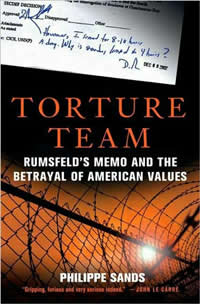Book Notes
 Philippe Sands, Torture Team; Rumsfeld's Memo and the Betrayal of American Values (New York: Palgrave, 2008), 254pp.
Philippe Sands, Torture Team; Rumsfeld's Memo and the Betrayal of American Values (New York: Palgrave, 2008), 254pp.
In November 2001, al-Qahtani Mohammed was captured in Afghanistan and sent to the American detention facility at Guantanamo, Cuba. About a year later, it was discovered that he had likely been an additional hijacker for the 9-11 terrorist attacks and a member of al-Qaeda, and so he was placed in isolation for 160 days. During that time he was subjected to aggressive interrogation techniques twenty hours a day for fifty-four straight days. His interrogation logs, in fact, were published by Time magazine on March 3, 2006, and Sands sprinkles excerpts of them throughout his book. al-Qahtani was not charged with any crimes for six years, not until February 11, 2008, and those charges were dropped by the Pentagon on May 12, 2008.
Philippe Sands teaches at the University College London, and is a leading expert in international law. He participated in the torture cases of Pinochet and Charles Taylor. His book is meticulous in detail, exhaustive in its research, fairminded in letting all the protagonists explain their versions of the story, cautious in his language, surprisingly suspenseful given the arcane and complex nature of the subject matter, and, more than anything else, devastating in its conclusions. Sands believes that al-Qahtani's treatment amounted to torture, and that those who were responsible for his treatment are guilty of war crimes in light of the Geneva Conventions (Article 3) and the 1984 Torture Convention. Of course, in the world of realpolitik they will not be prosecuted here in America, but Sands is deadly serious in his sober advice to the Bush lawyers (William Haynes, Doug Feith, David Addington, Alberto Gonzales, John Yoo, and Jay Bybee) who provided legal rationalizations for the torture — be very careful about traveling overseas.
Sands draws other conclusions. The decision to torture al-Qahtani did not bubble up from the bottom at Guantanamo, as the Bush administration claimed, but was explicitly directed by Rumsfeld's office and his now infamous "torture memo" that included eighteen interrogation techniques. Abuses at Guantanamo clearly "migrated" to Abu Ghraib. Torture is always immoral in principle (cf. the Universal Declaration of Human Rights). Experts suggest that it produces unreliable results, and that proved to be the case with al-Qahtani, as no meaningful intelligence was gathered from him. His treatment was a betrayal of American values and longstanding military practice. It put American soldiers at risk and undermined America's reputation abroad. But the Bush administration argued that the extraordinary times required extraordinary measures, that there were palpable fears of further attacks, and so they sought the legal fig leaf to cover what they intended to do no matter what. As with the run-up to the Iraq war, normal processes were subverted.
In his acknowledgements Sands pays special tribute to the career military lawyers he encountered. A list of principal characters and a chronology of events supplement his narrative. This book has earned high reviews, and is often mentioned in conjunction with The Dark Side: The Inside Story of How The War on Terror Turned into a War on American Ideals (2008) by Jane Mayer.


